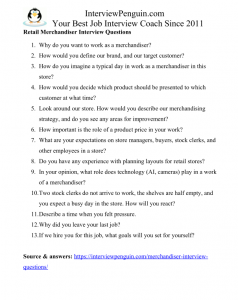Having many different products in a retail store is one thing. Displaying them in a way that stimulates customers to make a purchase another. Countless case studies and experiments proved that one inch higher, or one shade of color darker, can make 2% of difference in monthly sales. And that’s no small number for any retailer.
Good merchandisers are like magicians. With a little touch here and there, a change that may seem negligible to a common eye–and costs nothing, they can make a real difference for their employer. Now we will look at some questions you may face while interviewing for this interesting job. Enjoy!
Table of Contents
Why do you want to work as a merchandiser?
Because you know that the devil is in detail. You have the passion for design, for identifying patterns in customer behavior, and you enjoy making a difference with your work.
This is no shelve-stocking job for you, though you understand that you may restock some shelves. But all you will do will be done with a purpose, and in no hectic fashion. You feel like a fish in the water in this field, and that’s why you want to work as a merchandiser.
But, of course, there’s more behind your choice. You studied marketing, you read countless case studies, and have an idea how to touch the heart of a customer. Perhaps you even had a similar job before, did many experiments, and can use the data you collected up to this point to succeed in your new merchandiser position.
How would you define our brand, and our target customer?
Interviewing for some jobs, you may succeed without doing a proper research about your prospective employer. It’s never the case when you try to succeed in an interview for a position of a merchandiser.
Check their website, read their mission statement, visit some of their stores. Observe how the sales people and customer service workers behave. Notice how they present their goods, what items they display in the show-window, whether they focus on price, quality, or even on something else.
You should also take notice of the customers. Are they old, young? To which income group do they belong? Make notes, and try to understand their customer, brand, and also their current merchandising strategy. This should help you to formulate a great answer in your interview.
Remember that you do not have to be 100% right about their brand or target customer. What matters most is that they see that you did your research, that you care, and know the basics of marketing.
How do you imagine a typical day in work as a merchandiser in this store?
This depends on the seniority of the role, and also the size of the store. You can either list some duties you may respond for (job description will help you here), or describe an idea of a typical day, from morning to evening. To some common responsibilities of merchandisers belong:
- Analyzing market trends, sales figures, and customer behavior, and planning and designing merchandising strategies accordingly.
- Anticipating product needs and cooperating with buyers to ensure you have the right products at the right time in the right quantity.
- Following your merchandising strategies while translating them into a daily work of displaying and arranging products in a way that induces the customers to visit the store and eventually make a purchase.
- Experimenting with innovative approaches to your work, while you try to maximize the profits of your employer.
Ideally you should show proactive approach to work, and also ensure the interviewers that you do not restrain from manual labor. Try to talk with enthusiasm about your idea of a typical day in the job. They should get an impression that you are looking forward to start.
Special Tip: What if I told you that you can practice your answers to all tricky merchandiser interview questions, getting an immediate feedback from a life-like AI interview coach? And that you can start doing it for free, and it is a lot of fun too? 🙂 Check out this page on our partner website, Real Mock Interviews, pick a question, enter your email, and start practicing for free, either on your mobile phone or on your computer. Check it out now and see for yourself!
How would you decide which product should be presented to which customer at what time?
Tell them that you believe in data-driven decisions. If you apply for a job with a bigger retail chain, they certainly have their strategies in place. They continue doing their experiments and spending thousands (sometimes millions) of dollars each year, trying to find the winning combinations. And they have a lot of data about customer behavior.
In such a case you will simply work with the data they have, and make your decisions accordingly, continuing with experiments on a small scale, and applying the proven strategies on a large scale.
In a smaller store (or in an entirely new store), you can say that you will make your own experiments to collect data, plus you will learn from their competitors, who have a similar store setting and target customer.
Why would you reinvent the wheel? Learning from the successes (and failures) is much more efficient, though you should never rule out your own experiments entirely.
Look around our store. How would you describe our merchandising strategy, and do you see any areas for improvement?
Let’s firstly analyze the first part of the question. Imaging entering the store. Walking in, which products do you spot first? Do they advertise seasonal sales? How many products do you spot, and what music plays in the store? Which products are on the eye level of a typical adult, and which are hidden somewhere down, close to the ground, or in areas of the store where people rarely look or venture?
When customer buys one product, are related products (purchasing of which makes sense) nearby? Is the store divided into any sections? Is it easy for the customer to find what they are looking for? Is the store visually appealing? Are you impressed?
Asking these questions, you should find good words to describe their merchandising strategy. Areas for improvement is another matter altogether though…
If you do not spot anything apparent, you should simply say that you will need to see the data about their sales of various products and collections, as well as their purchasing plans, to identify areas for improvement. And if you like the current setup you can always praise them for the good work.
How important is the role of a product price in your work?
This is a tricky question. Good merchandisers do not rely on price cuts to help them sell a bigger quantity of a certain product. Because someone else is responsible for setting prices and arranging deals with suppliers.
Surely, you will play your part in the process, communicating with buyers (purchasing agents), sharing your opinion, giving suggestions. But you won’t decide about the final price a customer will pay.
You can, however, ensure the interviewers that you understand that price matters for a customer. If you offer some items for a great price, as a merchandiser you can ensure that the price tag is clearly visible, in the right color (red, for example, since people associate red price tags with discounts), and so on.
And you will certainly ensure to display the products in a way that induces a perception of a higher value in the eyes of the target customer (labeling them as premium, showing them close to similar products that are already considered premium by an average customer, etc).
Price matters. Show the interviewers that you know how to benefit from both low and high prices as a merchandiser.
Special Tip: You can also download the list of questions in a one page long PDF, print it, and practice your interview answers anytime later:

What are your expectations on store managers, buyers, stock clerks, and other employees in a store?
You have two options for a good answer. First one is saying that you have high expectations on one person only–on yourself. You want to be the best version of yourself, try your best in job each day, build good relationship with your colleagues. Once you manage to do this, on a continual basis, you are sure that your colleagues will follow suit and the cooperation will be great.
Another option is highlighting the importance all these employees play in your work. Some have daily contact with customers, other with suppliers. Some will hopefully follow your orders, while stocking shelves with the right products at a right time.
Basically each employee in a store can provide you with valuable feedback, and with information that can help you make right decisions as a merchandiser.
That’s exactly what you expect from them–honest feedback, open communication, constructive ideas (including criticism), and that they give you a chance to prove your skills over time, since you’ll be a new force in the company…
Other questions you may face in your merchandiser interview
- Do you have any experience with planning layouts for retail stores?
- In your opinion, what role does technology (AI, cameras) play in a work of a merchandiser?
- Two stock clerks do not arrive to work, the shelves are half empty, and you expect a busy day in the store. How will you react?
- Can you handle pressure?
- Tell us about an obstacle you overcame.
- Why did you leave your last job?
- Describe a time when you felt overwhelmed with work.
- If we hire you for this job, what goals will you set for yourself?
- What do you hope to gain from this experience?
- Why shouldn’t we hire you?
* Special Tip: If you are not sure how to answer the questions from my list, or experience interview anxiety, have a look at our Interview Success Package. Up to 10 premium answers to basically all tricky questions you may face in your Merchandiser job interview will help you streamline your interview preparation, outclass your competitors, and eventually get this great job. Thank you for checking it out!
Final thoughts
It is not easy to forecast the exact questions you will get while interviewing for a “Merchandiser” position, since your responsibilities may vary a lot from one store to another.
In some places you may get a free hand, and decide about everything from store layout to product prices. In some other stores you’ll get an extensive training, and will mostly follow the directions of your superiors (typically someone who’s responsible for the merchandising strategy of the entire retail chain).
In any case, try to prepare at least for the questions I analyzed in this article. You should also learn as much as you can about your prospective employer. Information will help you with answers to questions that relate to their existing merchandising strategies, and also to build a good connection with your interviewers.
I hope you will succeed, and wish you good luck!
Matthew
May also help you succeed:
- Store manager interview questions.
- Interview attire special tips – Not sure what clothes to wear? We have the answers.
- Fashion designer interview questions.


